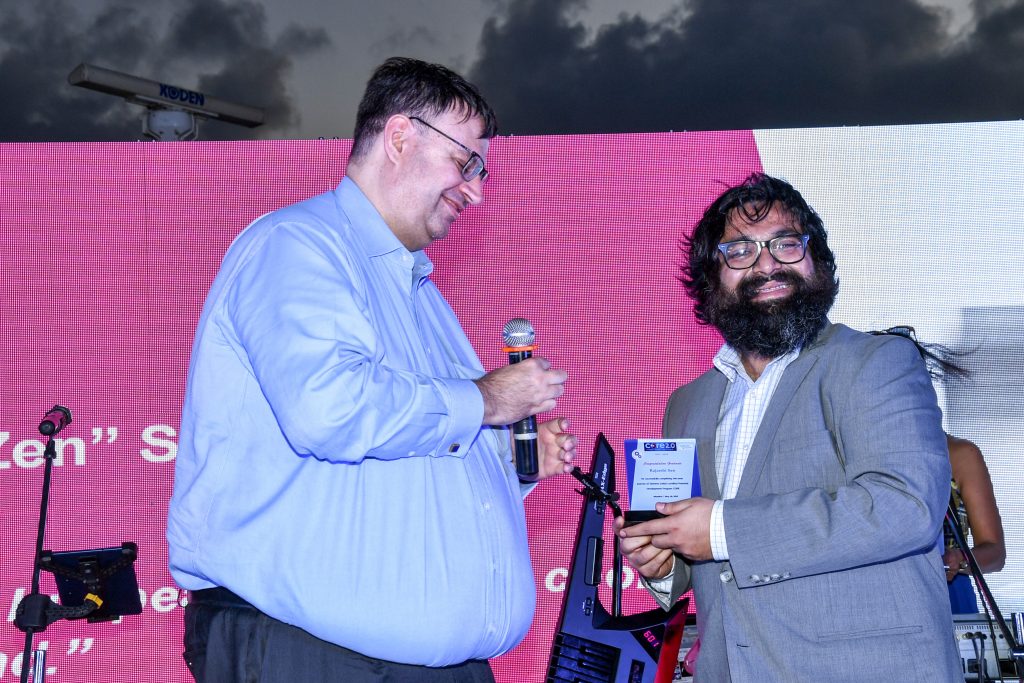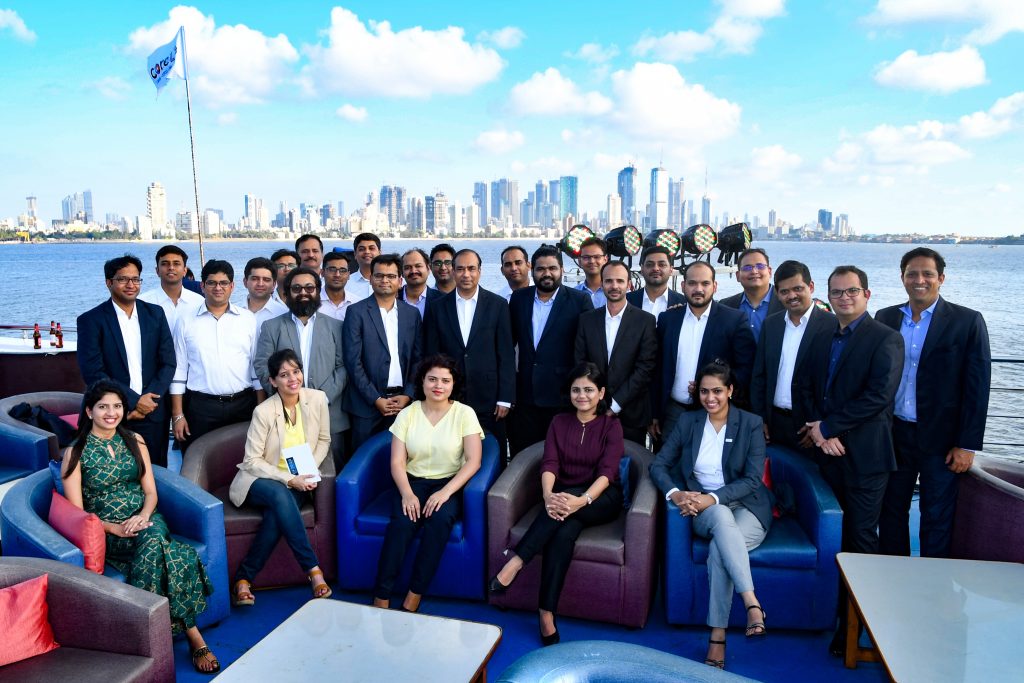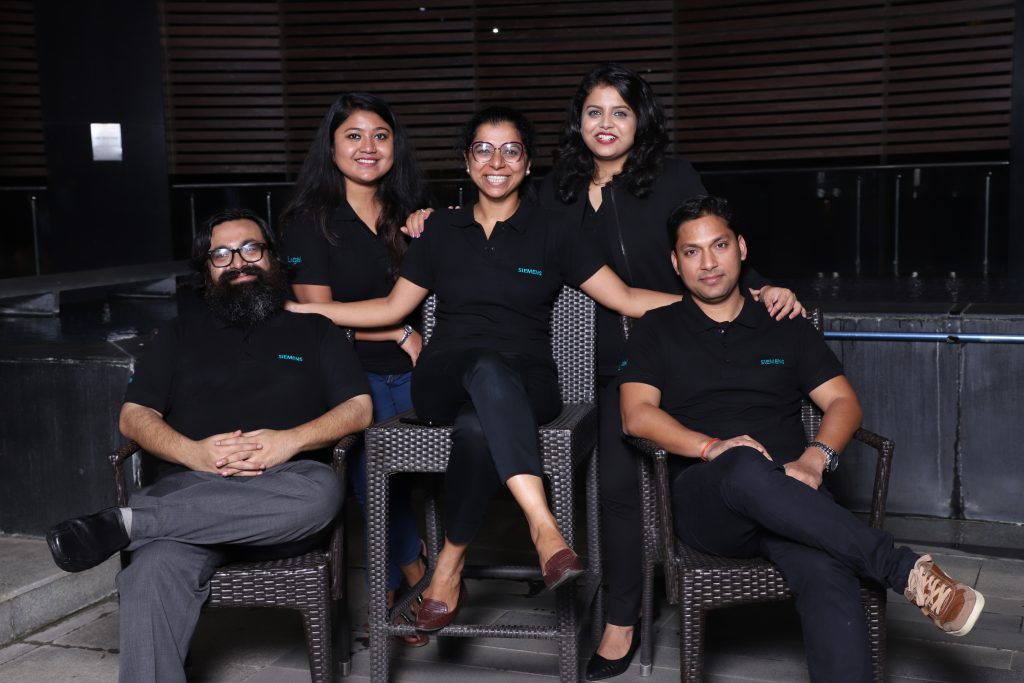RAJARSHI SEN, LEAD COUNSEL – SIEMENS ENERGY INDIA AT SIEMENS, ON PURSUING LAW, HIS ROLE AS AN IN-HOUSE COUNSEL AND HIS ADVICE TO LAW STUDENTS & YOUNG LAWYERS

This interview has been published by Maaz Akhtar Hashmi and The SuperLawyer Team.
You have had quite a journey as a law student at National Law University Jodhpur and then as an in-house lawyer with TATA and Siemens groups. How did you come to choose law as a career?
Accidentally. I fully intended to study English or history or even journalism. Then a couple of my friends applied for law school entrance exams, so I decided to give it a shot. I did not know that law school tutorials existed back then, so my preparation was limited to solving collected question papers. I was on the waitlist for some other law schools but got through National Law University Jodhpur.
I was ridiculously underprepared for law school. So much so that I seriously contemplated leaving for the first few months. Many of my batchmates were already familiar with what was being taught in class from law school tutorials and already knew much more than me about law and the legal profession. Some of them even had a clear career plan in mind and knew which magic circle law firms they wanted to join when they graduated. I did not even know what a magic circle was! I kept imagining a bunch of wig-wearing black-robed lawyers standing in a circle holding thick ancient books and chanting magic spells in an archaic language. Of course, I was completely wrong about that – the wig and black-robe are no longer compulsory.
Luckily, I realized – through some amount of trial and error and a lot of help from my friends – that law is mostly general knowledge and common sense. That made it much easier to find my way in law school over the next five years.
Did you ever regret your choice to stay on? How would you describe your time at law school overall?
Never. I made some lifelong friends, had some life-changing experiences, and had a lot of fun along the way. I also managed to learn something about the law. I still rely on the expertise and experience of my fellow alumni whenever I have questions, which is quite often.
It would be unfair to paint a completely rosy picture, though. I also experienced some bullying (including some death threats!) for my political opinions. My room was broken into several times, and my possessions (especially my books) were vandalized and mutilated. One time, I came back from dinner to find that there was a fire in my room. Perhaps it was the recklessness and stubbornness of youth, but I did not take it as seriously as I should have.
It was only much later that I realized that we do not talk about the toxic aspects of law school and the legal profession enough. My silence was part of the problem. Even now, we have barely begun to have the conversation about how to create safe, inclusive and welcoming spaces for everyone. I am glad that my time in law school taught me this important life lesson. Overall, I gained a lot more from the experience than I had ever imagined.
During your time at law school, you held quite a few positions of responsibility in the NLUJ Law Review, the Film Society and the Literary & Debating Society. How did this contribute to your development as a lawyer?
I never really looked at them as positions of responsibility. I always enjoyed extra-curricular activities more than being in the classroom. I was just grateful that law school gave me the opportunity to indulge in all my favourite activities – debate, drama, film and literature. I co-founded the Film Society and the Literary & Debating Society so that I could do just that.
Our school and college life are the best time to find out what we are interested in outside of academics and work. This is what makes us more interesting and helps us to be interested in others. This is especially important for us as lawyers because we work with people all the time, even though we tend to forget it! Law schools already have quite an active extra-curricular calendar in terms of moot courts, sports and cultural events. But there is always so much more that can be done.
The Film Society would screen one movie every week. The screening was open to all, and we had special dispensation to stay up late, so we got quite good audiences. The Literary Society also met once a week to discuss what we were reading and writing. The Debating Society was also quite active – we went to lots of debates across India and – on one memorable occasion – even Bangladesh. I got the opportunity to travel and meet lots of interesting people. This helped me make friends across disciplines, something that does not happen too easily when you are in the law school bubble. It also taught me the importance of finding time for yourself to relax and unwind – in good times and bad. In some ways, I was already a firm believer in work-life balance even before I began my career.
Your career journey began at Voltas Limited as their Legal Counsel in 2009. Most law students aspire to join law firms or litigation practice. What factors made you choose the road less travelled?
Again, luck played a role. I knew that work-life balance would be quite a challenge if I chose to join a law firm or a litigation practice. One of the senior lawyers I had worked with warned me that I should opt for litigation only if I had some financial stability for the next 5-10 years as it would take that long to make a mark as a first-generation lawyer. I did not.
So, I was very lucky that a team from TATA Group led by the then General Counsel decided to come to NLUJ for campus recruitment. They were looking for someone to work on some international disputes for Voltas Limited, which is one of their group companies. Everything just fell into place – I was the right person in the right place at the right time!
I spent two years working for Voltas on some major infrastructure disputes in India, the Gulf and Singapore. I enjoyed every minute of it. I had to unlearn almost everything I knew about legal research and drafting and relearn how to work on a real live dispute with factual backgrounds going back years or sometimes even decades! Over time, the business and project team colleagues started approaching me for contract and claim management topics at the pre-dispute stage. This was when I realized that part of the magic of working in-house is that you can (and should) get involved long before the faeces hit the fan. Our job is to help prevent disputes rather than fighting them! I learned so much about how to think like a business lawyer. I had some great mentors – both from the business and the legal team – some of whom had been in the industry for two or three decades!
All in all, I was very lucky to get an opportunity to work in both national and international environments at such an early stage of my career. A lot of my friends in law firms and litigation were surprised to learn that in-house lawyers got to travel to such interesting places and do such interesting work, plus have a work-life balance! To be honest, so was I.
Looking back, this really should not have been so much of a surprise for us. In law school, the focus is on law firms or litigation as career options. Granted that I should have probably taken matters into my own hands and done my research on possible alternatives. At the same time, law schools should widen the scope of the career advice that they give to law students. An in-house career should not be looked at as “the road less travelled” but as one of the many (often interconnected) roads that are open to lawyers.
I think this has already started – law students today are much better informed about the outside world than I was at the time. Alumni associations and external service providers like yourselves are already trying to explain various career possibilities after law school, such as academics, civil service, entrepreneurship, journalism, judiciary, public policy, strategy etc. However, there is a much broader mindset change that is still required. These career paths are still seen as being somehow less important or prestigious than the big two of law firms and litigation.

You then moved to Siemens as a Contract Manager in 2011 and currently hold the Lead Counsel position at Siemens Energy India. How has your in-house journey been so far for you?
To be honest, luck played a role here as well. I was very happy at Voltas. At the same time, living out of a suitcase for most of the year was tiring. I missed home and my loved ones. One day I was at a conference where I connected with some contract managers from the Siemens India legal team. They were looking for someone with contract and claims management experience to work from my hometown Kolkata. Once again, I was just the right person in the right place at the right time!
I spent the next five years working on major railway and metro infrastructure projects as a Contract Manager for the mobility business. As a function, contract and claims management is a lot more collaborative and customer-facing than other legal roles. Ultimately, everyone on the project is working together for the common good of the project. So, you need to build trustful and collaborative relationships with each and every stakeholder. Even if you have the best legal arguments, you do not want to be in a dispute situation where you need to use them! Instead, you need to find commercial solutions that are a win-win for everyone. This tests your legal competence as much as your communication, negotiation and stakeholder management skills. I was very lucky to work with project and business teams where every meeting with external stakeholders was a masterclass in these skills.
One of the best things about working for a multinational the size of Siemens is the sheer variety of opportunities available internally in different functions, businesses and regions. When the senior legal counsel of the energy business left for other opportunities, I asked to be considered for the role. A couple of years later, my then reporting manager also left for other opportunities. I already knew the team, the business and the organization as well as anyone – and they all knew me. Again, I was the right person in the right place at the right time!
The fact that I have been here for a decade now speaks for itself. I do feel like a dinosaur sometimes for having been around so long. But what is really cool is that I have friends in the legal department and the business who have been around even longer than I have. It’s always comforting to know that others have made the same mistakes that you have!
Jokes aside, it’s been an amazing journey – the work has been exciting, the challenges have been stimulating, and the lessons learned humbling (to say the least!). Some days were tough and frustrating, while others were more exciting than I would have hoped for. A few (thankfully very, very few) were boring. Every single day of these last twelve years was a crash course on being an in-house lawyer in a multinational, multicultural environment. Especially the bits that they somehow don’t teach in law school but definitely should (like brevity, effective communication and intercultural stakeholder management). What has made it all worthwhile has been the comradeship and the camaraderie along the way. There’s something to look forward to almost every single day – I’m always either learning something new, working on something exciting or even making new friends in different parts of the world.
Can you walk our readers through a typical workday as an in-house lawyer?
It is a little difficult to describe a “typical day” as an in-house lawyer. This is simply because of the sheer range of subjects that we get to work on almost daily. As business lawyers, we are usually generalists (even if we sometimes have our own specializations). We have to look at anything that comes to our table, especially if it involves a legal issue but sometimes even if it doesn’t! Often, the largest chunk of our time is spent understanding and collating the facts, strategizing on commercial solutions and ensuring alignment between business and corporate functions etc. Some may consider this non-legal work – especially if they believe that a lawyer should only deal with pure legal topics. I disagree; I believe that this is at the heart of what we do as lawyers. We apply the law to uncertain situations to achieve a satisfactory resolution. This means that a solid understanding of legal concepts and the ability to apply these concepts in practice is just basic table stakes for being an in-house counsel.
Another major chunk of what we do as business lawyers is contract management throughout the entire contract lifecycle. We get involved right at the start at the business development or bidding or contract negotiation stages to identify, evaluate and try to mitigate contractual risks. During the contract execution stage, we work with the business to resolve any issues which may arise, preferably without litigation. When litigation becomes necessary, we handle most of the work in-house. We develop the overall dispute management strategy, the arguments and counter-arguments and then brief external counsel to argue the matter.
Every once in a while, there’s also some transactional work. The frequency really depends on the organization. In an organization as large and complex as Siemens, there’s always some restructuring (including mergers, demergers, share transfers etc.) going on somewhere in the organization. I have personally been through 4 internal reorganizations in my 10 years at Siemens. Sometimes, the only thing that changed for me was the details on my business card. Others were more profound and required more work. During this time, we also carved out our healthcare and logistics businesses, both worldwide and in India. Recently, we completed a major transaction for the global carve-out of Siemens Energy and a transfer of 24% shareholding of Siemens India from Siemens to Siemens Energy. This took up most of our time for more than a year.
There’s also a fair bit of corporate work. As a governance function, we act as one of the conscience-keepers of the organization by conceptualizing, implementing, and overseeing internal processes which ensure that we do clean, compliant and sustainable business.
Recently you did an Executive Education Programme from IIM Bangalore. It is often said that in-house lawyers are not only legal advisors but also business advisors. Do you agree with this school of thought?
The IIM-B course was part of a two-year potential development programme organized by Siemens. The idea of this potential development programme – which is currently on its fourth batch – is to bring together a diverse bunch of young people within the organization with the potential to grow and then give them opportunities to learn by doing. I was part of the second batch of thirty colleagues who were chosen for this programme. The highlight was spending five weeks on campus in IIM-B learning strategy, communications, career management, corporate finance, sales and marketing, human resource management etc., from their faculty. Since it was an on-campus programme, the thirty of us quickly became close friends. Looking back, we learned as much from each other as we did from the faculty! What I learned over the course of the two-year programme definitely helped me be a better version of myself, not just a better business lawyer.
As far as being a business lawyer goes, I would go even further than that and say that we are not just business advisers but strategic business enablers. The days when in-house lawyers sat in an ivory tower of their own making, spoke in a strange language called legalese to the business and tried to eliminate all risks through “write-only” legal documents that no one else reads are long gone. Legal is no longer the department of “no” but the department of “yes, and…”. Our business colleagues know that we will provide strategic advice and practical, commercially viable solutions that help the organization to grow sustainably. Our internal processes are built in such a way that legal and business as well as other functions (to name just a few – bid management, project management, finance, risk and internal controlling, sustainability) need to work together from the very beginning to the very end. This is a win-win for everyone. As support functions, we get to be involved from start to finish and have instant access to all the information we need to do our jobs. And the business has instant access to practical and solution-oriented advice. Of course, we are still a governance function and need to take some difficult decisions. This is actually much easier to do as the department of “yes, and…” – when your business colleagues know that you always do your best to find a solution, they respect your decision much more when you say that this is not the right thing to do. Luckily, such situations are quite rare.

You took on a leadership role just a few months before the pandemic hit. How did you stay focused on team management and handling high stake tasks with such a crisis happening just a few months into a new role?
Again, I was just very, very lucky. One of the many benefits of being a relative dinosaur in the department is that I already knew the business and the team very well. We were friends, and we worked well together. I got some great advice when I took over this role, which was to just be myself. After all, what can be easier than leading a team of your own friends? All I had to do was get out of the way so that we could all be ourselves. And it has worked out great.
Of course, the pandemic and lockdown affected everyone both personally and professionally. Professionally, we took the lead on crisis management from a contractual perspective. Luckily, we already had fairly mature project management and contract management systems in place. This helped us to streamline our COVID-related correspondence with customers, subcontractors and other stakeholders through a judicious mix of global standardization at a macro level and hyper-local strategies at a micro-level. The fact that this happened in the middle of a major transaction (the global carve-out of Siemens Energy) was quite a stretch for all of us.
On the bright side, this meant that we were fully occupied at a time that business came to a grinding halt for many organizations. Making the switch to working from home was fairly easy because we had already built a culture of trust, empowerment and proactive collaboration within the team. These are values that you need to build over time; it does not happen overnight. We had been living these values every day, even before the pandemic. We already had a practice of having a mid-week catch-up call where we discuss what we are working on, what is going well (and therefore we should do more of), what could be better (and therefore we should do differently) and where we need support from each other. This was really helpful because we could re-distribute the workload dynamically to make sure that everyone had some breathing space to take care of themselves and their loved ones during – and we tend to forget this – an unprecedented global crisis. In times like these, you have to have each other’s backs. And that’s what we did. And the best part? That it happened organically – because we were already doing it anyway. The crisis was just the backdrop.
Of course, like everyone else, the pandemic affected us all either directly or indirectly. Everyone lost someone – friends, family, colleagues. In times like these, you need to find ways to still have fun as a team. This may seem silly, but one of the things that we realized we really missed as a team were our water cooler conversations over tea/coffee. We built this back into our regular schedule with Friday Fundays – this started as a way to connect with each other every Friday evening over your drink of choice to just chat about our personal lives. The only two rules of Friday Fundays were “we do not talk about work” and “we do not talk about work”. Since we were already friends, the conversation always flowed easily. We felt lighter going into the weekend, having had these chats. Soon, we extended them to old friends in other teams – inviting colleagues from different functions and businesses whom we missed hanging out with. They loved the idea too. Then we started to invite colleagues whom we wanted to get to know better, and they loved the idea even more. From being a way to help us stay connected within our team while we all worked from home, it has now become a way of networking and making new friends across the organization. The contribution to our overall mental health was immeasurable.
You have been quite vocal on the topic of mental health in the legal profession. What measures can we take in the coming years to ensure the mental health and well-being of legal professionals?
Not vocal enough! For example, this is the first time that I am talking about the bullying that I experienced in law school on a public forum. I have talked about this in my personal and professional groups, but I should have been much more vocal about this from the beginning. Most lawyers struggle with mental health challenges in silence, as I did. At the root of it all is the culture of perfectionism in the legal profession, which stigmatizes “weakness”. This is what ultimately leads to impostor syndrome, lack of work-life balance and burnout.
Lawyers see themselves as problem-solving superheroes who always have the right answers to any and every problem. When we quite inevitably fail to achieve the impossible standards that we have arbitrarily set for ourselves, we overcompensate by working harder and longer hours to prove ourselves not just to ourselves but to those around us as well. More office-time, more work, more side projects, more billings, more clients, more revenue, more more more. We feel like we must be workaholics who are available 24/7/365. Why? Because we compare ourselves to others and see that everyone is doing it. There’s no shame in admitting that we have all done this. In fact, it’s important to understand that we ALL do this. A lot of the guilt and anxiety of impostor syndrome is feeling like the only impostor surrounded by otherwise perfect beings. It’s illogical, but it’s true. The first step is admitting it.
How do we overcome it? Well, of course, there are far more mental health resources that are available nowadays than ever before. The problem is the stigma of “weakness” associated with seeking professional help for mental health in the legal profession. So it is critical that we address the root cause of the culture of perfectionism in the profession, which causes such issues in the first place.
One of the best coaches I ever met once told me that “perfect is the enemy of good” and “good is good enough” – it was a small but simple realization which stayed with me. We can adopt a growth mindset only when we stop chasing the impossible dream of perfectionism. Instead of wasting time comparing ourselves to others, we can focus on simply being better than we were before. Made a mistake? That’s okay! Instead of telling ourselves that we are terrible at this (which will become a self-fulfilling prophecy), we can think about what we can do better next time. Is there someone better at this than we are? That’s great! Instead of telling ourselves that we will never be as good as them (which leads to further anxiety and impostor syndrome), we can ask them for help so we can do better.
One simple example – I struggle with timeliness. For example, joining meetings on time used to be a challenge because my calendar was so packed. This is a problem that’s gotten a lot worse for all of us while working from home, with back-to-back meetings becoming the norm. One of the best hacks is to let the problem (our schedules) be part of the solution. Instead of being a slave to my calendar, I started to use it to my advantage. If I had an important task, I would schedule a meeting with myself to complete that task. If someone called me in the middle of working on this task, I would just tell them when I am free next and ask them to schedule for a more convenient time. My schedule immediately became much more manageable.
Another great hack was to use the meeting reminders to my advantage. Earlier, I would only start wrapping up what I was doing when I got the 5-minute reminder for my next meeting. Now, I use the 15-minute reminder to do that. If there’s too much left to do, I schedule another slot to finish that work instead. This leaves me with enough time to get prepared for the next meeting. And the 5-minute reminder? I now use it to do nothing at all. I clear my mind and focus on being mindful. This may seem like a silly example, but the benefits to my mental health have been immeasurable. You just need to find what works for you.
Of course, this can only work if our workloads (and timelines!) are manageable in the first place. This is a structural problem that can only be addressed if we start setting healthy boundaries while still being flexible. I keep reminding my team and my business colleagues that if everything is urgent, then nothing is urgent. To set reasonable timelines, we need to distinguish between urgent tasks (which are time-sensitive in the short-term) and important tasks (which contribute to your long-term goals) and then prioritise accordingly:
| URGENT | NOT URGENT | |
| IMPORTANT | Prioritize tasks with significant outcomes and clear deadlines | Schedule tasks with significant outcomes but no fixed deadlines |
| NOT IMPORTANT | Delegate or streamline (standardize/templatize) tasks with clear deadlines but which require less expertise | Delete or mechanize tasks that do not add any measurable value |
Last but certainly not least, the usual boundaries between our personal and professional lives have dissolved, with hybrid working becoming the norm. That is not necessarily a bad thing. We can embrace the flexibility this gives us to manage our workload better by deciding when we are “in the office” and when we are “at home”. For example, I find it helps me to take breaks in between office work to do household chores like prepping meals, cooking and cleaning. Others may prefer to continue having a clear distinction between office/home, for example, by doing office work between 9-to-5 and taking care of household chores before or after that, or starting office a little later in the day after taking care of some household chores and then working till a little later in the evening. Or vice versa. It all depends on what works best for you. At the end of the day, it’s important to get some “me-time” and “we-time” to focus on ourselves and our loved ones. Some people are calling this work-life integration because you can choose how to integrate different aspects of work-life balance into your schedule in a flexible way.
We can only do this if we – as employers and employees – change our mindset to start focusing on achievements in terms of outcomes rather than activity and office time. We don’t (and we shouldn’t!) have to do this alone.

What would be your advice to law students and young lawyers who aspire to establish themselves as in-house counsels?
I get these questions quite frequently from law students and young lawyers. This is a very positive development because it shows that they are already aware that an in-house career is a viable career option and are actively considering it. I usually try to turn the questions around and ask them what they want and expect in terms of purpose, roles and responsibilities, career growth, compensation structure, flexibility and work-life balance. Based on their responses, I try to explain what in-house life has to offer them.
The most frequently asked question is how to get an in-house role. For example, we get a lot of requests from law school placement committees to attend campus recruitment. We also get a lot of internship applications from law students who tell us that they would be interested in securing a pre-placement offer. Finally, we also get requests for referrals for roles within the organization. I have to explain that in-house recruitment works very differently from law firm recruitment simply because an in-house team is part of a larger business organization and therefore is structurally different from a law firm.
In-house teams have a fixed headcount which increases irregularly over time (rather than annually, as in law firms). This means that it is quite difficult for in-house teams to make recruitment offers in advance. Most in-house vacancies become available as and when the incumbent leaves for other opportunities. Such roles are usually advertised on the organization’s careers page, job aggregator sites and through recruitment consultants. You will then need to do some research on whether this is the right role for you. This is where dinosaurs like us can be of some help. Have you seen an in-house role that interests you and want to learn more about it? Come to us with your questions, and we would be more than happy to help! Not with a referral because a referral for someone you do not know and have not worked with is fairly useless. But to help you understand how you can be the best fit for a particular in-house role and then excel in it:
- Know yourself – What kind of career interests you? Do you want to be more of a generalist or specialist? Do you want to focus on doing interesting legal work or take on more and more administrative responsibilities? There are no right or wrong answers because this depends entirely on what works best for you at that time. You can always change your mind and try something else because there will be lots of opportunities to do different things in every organization.
- Know the business – As an in-house lawyer, you are a strategic business enabler whose job is to help the business succeed in doing clean, compliant, sustainable and, of course, profitable business. To do this, you need to know the business as well as your business colleagues do – what do we sell? who do we sell to? Who are our competitors? What are our short-term and long-term strategic goals? Law school does not prepare you for any of this. Thankfully, most organizations have technical and finance trainings for non-technical/non-finance colleagues who do a great job in explaining these topics in language that even a lawyer can understand!
- Develop your soft skills – Legal competence is a basic expectation of every in-house role. However, what will get you noticed is your soft skills because – consciously or unconsciously – everyone in the organization is constantly evaluating you on these skills. This can be tricky for lawyers because law school does not help develop skills like approachability, empathy, active listening, effective communication, strategic thinking, ownership, curiosity and even common sense. In fact, what we learn in law school can hinder the development of these skills without us knowing it. Again, most organizations have training programs that cover all these skills.
- Be the department of “Yes, and…” – Law school prepares us to analyze and avoid risks rather than mitigating them. To be strategic business enablers, we have to find common-sense, practical and commercially viable solutions. Our job is to advise the business to make sure that these risks fit the risk profile of our business and that they are approved at the right approval levels with the right mitigations in place.
- Ownership – Take ownership of everything you do. As lawyers, we tend to focus on legal aspects rather than the business aspects of an issue. Finding a commercial solution to a business issue requires different functions within the organization to collaborate. Legal is best placed to help steer this collaboration and be part of the ultimate (hopefully successful) outcome. This will make you the go-to person for everyone in the legal department as well as in the business. If you can also volunteer for some special projects or special topics within the legal department, you will have more opportunities to develop and demonstrate your capabilities to management. You just need to spot the right opportunity or even create them, if necessary.
- Make friends – It helps. It really does. Being able to bring my whole self to work and having fun at work gives me the psychological safety I need to be my best self at work. I am who I am today largely because of the friends I have made at work and outside work.
- Be the right person in the right place at the right time – I’ve always believed in the old Scouts & Guides motto – “Be Prepared”. Opportunities may come when you least expect them. It helps to think a few moves ahead – what are the skills that I need to do my current job? How can I develop these skills further? What are the skills that I need to do the next job I want to do? How can I develop those skills further? That way, when these opportunities do arise – you are already seen as the right person in the right place at the right time!
Get in touch with:

























